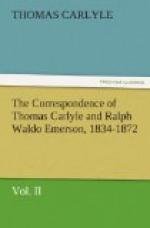I have had sad things to do and see since I wrote to you: the loss of my dear and good old Mother, which could not be spared me forever, has come more like a kind of total bankruptcy upon me than might have been expected, considering her age and mine. Oh those last two days, that last Christmas Sunday! She was a true, pious, brave, and noble Mother to me; and it is now all over; and the Past has all become pale and sad and sacred;—and the all-devouring potency of Death, what we call Death, has never looked so strange, cruel and unspeakable to me. Nay not cruel altogether, let me say: huge, profound, unspeakable, that is the word.—You too have lost your good old Mother, who stayed with you like mine, clear to the last: alas, alas, it is the oldest Law of Nature; and it comes on every one of us with a strange originality, as if it had never happened before.— Forward, however; and no more lamenting; no more than cannot be helped. “Paradise is under the shadow of our swords,” said the Emir: “Forward!”—
I make no way in my Prussian History; I bore and dig toilsomely through the unutterablest mass of dead rubbish, which is not even English, which is German and inhuman; and hardly from ten tons of learned inanity is there to be riddled one old rusty nail. For I have been back as far as Pytheas who, first of speaking creatures, beheld the Teutonic Countries; and have questioned all manner of extinct German shadows,—who answer nothing but mumblings. And on the whole Fritz himself is not sufficiently divine to me, far from it; and I am getting old, and heavy of heart;—and in short, it oftenest seems to me I shall never write any word about that matter; and have again fairly got into the element of the IMPOSSIBLE. Very well: could I help it? I can at least be honestly silent; and “bear my indigence with dignity,” as you once said. The insuperable difficulty of Frederic is, that he, the genuine little ray of Veritable and Eternal that was in him, lay imbedded in the putrid Eighteenth Century, such an Ocean of sordid nothingness, shams, and scandalous hypocrisies, as never weltered in the world before; and that in everything I can find yet written or recorded of him, he still, to all intents and purposes, most tragically lies




